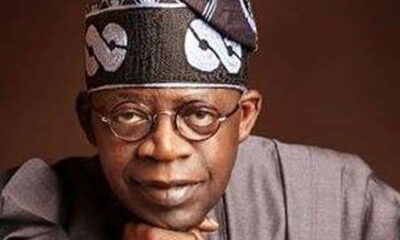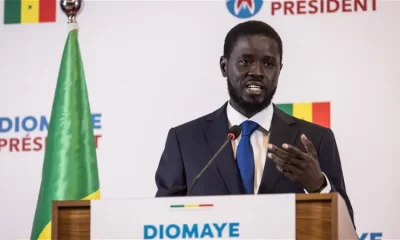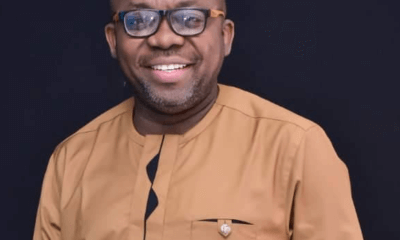Political Issues
Akpabio’s Insensitivity, Shettima’s Sensitivity, and the Citizens’ Cry: Economic Pain Amidst Birthday Celebrations in a Stadium -By John Egbeazien Oshodi
The recent ‘Let the poor breathe’ comment made by President of the Senate, Akpabio during a plenary session, where he was seen laughing while, along with others, uttering remarks about poverty, was perceived by many Nigerians as a mockery by the elite. In a nation already grappling with economic trauma, this incident further exacerbated the challenges faced by the populace.
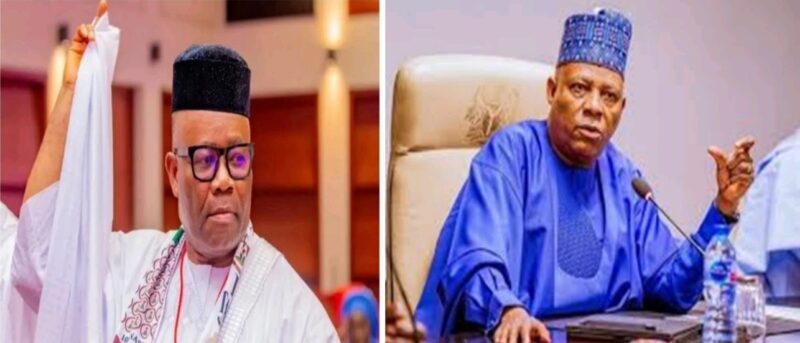
In the glaring spotlight of national economic hardship, the opulent birthday bash orchestrated by Senator Godswill Akpabio at the Uyo International Stadium has become a symbol of elite excess, inciting widespread public discontent.
Attended by a constellation of dignitaries, including President Bola Tinubu’s wife Oluremi, governors, the Deputy Senate President, Speaker of the House of Representatives, ministers, and other high-ranking officials, the celebration has laid bare the stark disparity between the privileged political class and the daily struggles of ordinary Nigerians.
Vice-President Kashim Shettima’s acknowledgement of the simmering anger among the impoverished masses towards government officials and the elite accentuates the growing rift between the ruling class and the citizenry. The grandiosity of the stadium celebration, juxtaposed against the pervasive poverty exacerbated by escalating living costs, has amplified public frustration to new heights.
Dr. Obiageli Ezekwesili, a former Minister of Education, vocalized apprehensions about the state of Nigerian democracy, attributing Akpabio’s political ascent to a compromised judiciary. Her critique delved into the alleged corruption within the Court of Appeal and raised pertinent questions about Akpabio’s legitimacy. The controversial decision by the Supreme Court to reinstate Akpabio as the senatorial candidate for Akwa Ibom North Senatorial District has only intensified tensions, casting a shadow over the credibility of the judicial system.
Akpabio’s extravagant celebration serves as a stark reminder of the ethical responsibilities leaders bear, especially in times of national crisis, prompting a collective call for a more compassionate and accountable approach to governance.
The timing of Akpabio’s spectacle against the backdrop of economic hardship has spurred questions about the leaders’ understanding of the struggles faced by the general population. Hosting such an ostentatious event in a stadium while citizens grapple with poverty highlights a perceived lack of empathy among the political elite.
The choice of a public stadium for a personal birthday celebration has further heightened concerns about appropriateness, especially when collective sacrifices are urged due to economic challenges. Mobilizing scarce national resources, including security officials, for such an elaborate event amidst economic hardships reflects a profound insensitivity, constituting a stark departure from the principles of responsible leadership.
In stark contrast, Vice-President Kashim Shettima’s acknowledgment of the anger among the poor resonates with prevailing economic realities. While Shettima aligns with the struggles faced by ordinary citizens, Akpabio’s extravagant celebration symbolizes a detachment from the economic plight of the masses.
Governance requires a deep understanding of the people’s struggles and an active commitment to addressing their needs.
While leaders like Shettima exemplify open and active sensitivity, it is essential for others, including Akpabio, to embrace a similar approach. By attuning themselves to the daily challenges faced by the citizens and demonstrating genuine empathy, leaders can bridge the gap between the governed and the governing, fostering a more inclusive and responsive government. Shettima’s leadership style serves as a reminder of the positive impact that leaders can have when they prioritize the well-being of their constituents and actively work towards uplifting the lives of those they serve.
President Bola Tinubu’s limited public presence during challenging times has stirred discussions about his leadership style. In an era marked by economic challenges, the public’s demand for visible and accessible leadership highlights evolving expectations around transparency and accountability. The incident involving Akpabio’s celebration has intensified discussions about political leaders’ priorities, emphasizing the need for responsible governance, especially during economic difficulties.
As citizens yearn for a recalibration towards servant leadership and responsible governance, the incident involving Akpabio becomes emblematic of compromised media and suppressed voices. The watchdog role traditionally ascribed to the media seems stifled or influenced, preventing it from unequivocally challenging leaders’ questionable behaviors.
In these challenging times, a collective cry emerges, questioning the divine presence and intervention. The desperate plea for divine guidance reflects a deep yearning for justice, accountability, and a moral compass to guide the nation. The call for divine intervention serves as a poignant reminder of the need for a moral awakening and a return to principled governance.
In essence, the lavish celebration by Akpabio, utilizing scarce resources, the nation’s police, and security officials for a stadium birthday extravaganza, raises profound questions about leaders’ priorities in the face of economic crisis. The public outcry is a powerful signal demanding a fundamental shift towards compassionate, accountable, and principled governance.
In the context of celebrating birthdays, it is essential to recognize that no reasonable mind is against such joyous occasions. However, there is a call for both common sense and democratic values to prevail in matters related to these celebrations. Striking a balance between personal festivities and societal considerations is crucial, ensuring that individual joy does not infringe upon the rights and well-being of others. This perspective emphasizes the importance of thoughtful and considerate celebration practices that align with the principles of democracy and shared societal values.
The recent ‘Let the poor breathe’ comment made by President of the Senate, Akpabio during a plenary session, where he was seen laughing while, along with others, uttering remarks about poverty, was perceived by many Nigerians as a mockery by the elite. In a nation already grappling with economic trauma, this incident further exacerbated the challenges faced by the populace. The phrase ‘Let the poor breathe’ encapsulates the sentiment expressed during those prayers. The hope is that, in the spirit of sharing the birthday cake observed by many Nigerians globally, many Nigerians can experience not the literal cake but a taste of their basic needs, contributing to an enhanced quality of life.
In the web of Nigeria’s political landscape, the extravagant spectacle of Senator Godswill Akpabio’s birthday celebration in the Uyo International Stadium stands as a vivid symbol of the widening chasm between the political elite and the struggling masses. As the nation grapples with economic hardships and calls for collective sacrifice, this grandiose affair not only underscores the urgent need for a recalibration towards responsible leadership but also serves as a stark reminder of the ethical void that some leaders seem to inhabit. The desperate cries for divine intervention and justice amidst compromised media channels paint a poignant picture of a society yearning for ethical clarity and principled governance.
It is a collective call for leaders to heed the public’s demands, to be attuned to the realities faced by ordinary citizens, and to embrace a more compassionate, accountable, and responsive approach to governance. The echo of this incident resonates as a wake-up call, challenging the nation’s leadership to rise above self-indulgence and lead with integrity in times of national crisis.
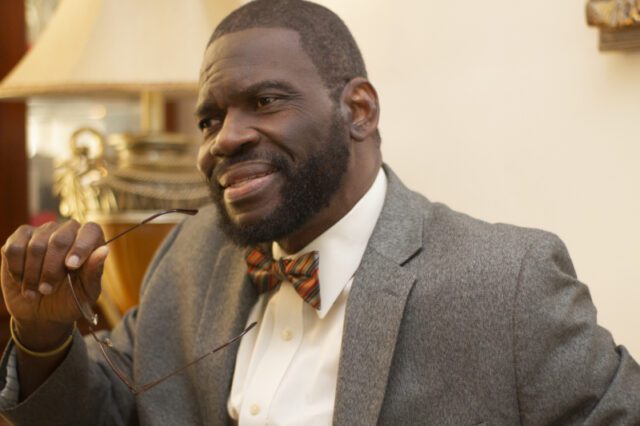
John Egbeazien Oshodi
Professor John Egbeazien Oshodi, who was born in Uromi, Edo State, Nigeria, to a father who served in the Nigeria police for 37 years, is an American-based police and prison scientist and forensic, clinical, and legal psychologist. A government consultant on matters of forensic-clinical psychological services in the USA; and a former interim associate dean and assistant professor at Broward College, Florida. The Founder of the Dr. John Egbeazien Oshodi Foundation, Center for Psychological Health and Behavioral Change in African Settings. In 2011, he introduced state-of-the-art forensic psychology into Nigeria through N.U.C. and Nasarawa State University, where he served in the Department of Psychology as an Associate Professor. He has taught at various universities and colleges including Florida memorial University, Florida International University, Broward college, Lynn University, and a contributing faculty member at the Weldios university in Benin Republic, Nexus International University, Uganda, Nova Southeastern University and Walden University in USA. He is a Human Rights Psychologist with a focus on African related environments. john.oshodi@mail.waldenu.edu

